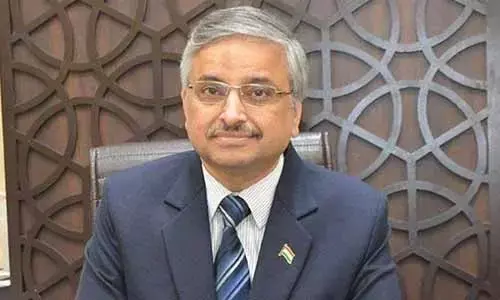- Home
- Medical news & Guidelines
- Anesthesiology
- Cardiology and CTVS
- Critical Care
- Dentistry
- Dermatology
- Diabetes and Endocrinology
- ENT
- Gastroenterology
- Medicine
- Nephrology
- Neurology
- Obstretics-Gynaecology
- Oncology
- Ophthalmology
- Orthopaedics
- Pediatrics-Neonatology
- Psychiatry
- Pulmonology
- Radiology
- Surgery
- Urology
- Laboratory Medicine
- Diet
- Nursing
- Paramedical
- Physiotherapy
- Health news
- Fact Check
- Bone Health Fact Check
- Brain Health Fact Check
- Cancer Related Fact Check
- Child Care Fact Check
- Dental and oral health fact check
- Diabetes and metabolic health fact check
- Diet and Nutrition Fact Check
- Eye and ENT Care Fact Check
- Fitness fact check
- Gut health fact check
- Heart health fact check
- Kidney health fact check
- Medical education fact check
- Men's health fact check
- Respiratory fact check
- Skin and hair care fact check
- Vaccine and Immunization fact check
- Women's health fact check
- AYUSH
- State News
- Andaman and Nicobar Islands
- Andhra Pradesh
- Arunachal Pradesh
- Assam
- Bihar
- Chandigarh
- Chattisgarh
- Dadra and Nagar Haveli
- Daman and Diu
- Delhi
- Goa
- Gujarat
- Haryana
- Himachal Pradesh
- Jammu & Kashmir
- Jharkhand
- Karnataka
- Kerala
- Ladakh
- Lakshadweep
- Madhya Pradesh
- Maharashtra
- Manipur
- Meghalaya
- Mizoram
- Nagaland
- Odisha
- Puducherry
- Punjab
- Rajasthan
- Sikkim
- Tamil Nadu
- Telangana
- Tripura
- Uttar Pradesh
- Uttrakhand
- West Bengal
- Medical Education
- Industry
Covid-19 pandemic showed how technology can be game-changer: AIIMS Chief

AIIMS Director Dr Randeep Guleria said there has to be a lot of focus on using technology.
New Delhi: The COVID-19 pandemic has showed the importance of technology and how if used properly can be a game-changer in the country where there is a big issue of resources and manpower crunch as far as the health sector is concerned, AIIMS Director Dr Randeep Guleria said on Friday.
Speaking at Public Affairs Forum of India's 8th National Forum 2021, he said the pandemic showed that if you do not have a healthy nation, you will have a fate on your economy, it could affect tourism, it will affect travel, and it will have a lot of other effects which are so-called collateral damage.
"The COVID-19 pandemic showed the importance of technology and it really showed that technology used properly can be a game-changer in our country where there is this big issue of resources and manpower crunch, as far as the health sector is concerned. So we've adopted teleconsultation very quickly, which allowed us to consult with a large number of patients across the country without them having to come to hospital. It was cost-effective," he said
Guleria also said that there is a huge inequity as far as health is concerned, both in urban and rural India, and that has to be addressed.
"And, I sometimes worry that we should make sure that technology doesn't increase that divide. We must make sure that we think it is more inclusive for even those who may not be that tech savvy, and that is very important in the tech sector," he said.
The AIIMS chief said there has to be a lot of focus on using technology.
"And, that is something that we need to do in terms of screening for non-communicable diseases or training for cancers, which will help in the burden of disease in a big way. We have to invest more in research, which is India specific and encourage more entrepreneurship," he said.
National Health Authority CEO RS Sharma said there are a number of areas in which the cost will significantly reduce using technology, and that significant reduction in cost will obviously be passed on to the service providers, and also to the people.
"I completely agree that technology has to be inclusive. It has to cater to diversity as it exists in the sector. It has to be interoperable. It has to be scalable. It has to be frugal. It has to you know be, kind of, people should find it very easy to use it, so it should be easy to kind of integrate in our workflow, it should not be an activity in itself, you know, catering to technological requirement should not really become an additional burden on the time of a doctor," he said.
Talking about privacy, he said the people think that designing for privacy will reduce functionality.
"The thing is that privacy is a zero-sum game, you know that if I make things private then I can't do anything to it. But that's not the case. If you design carefully, it is a non-zero sum game, you can continue to have all the functionalities without sacrificing privacy," he said.
A zero-sum game is a mathematical representation of a situation in which an advantage that is won by one of the two sides is lost by the other.
Medical Dialogues Bureau consists of a team of passionate medical/scientific writers, led by doctors and healthcare researchers. Our team efforts to bring you updated and timely news about the important happenings of the medical and healthcare sector. Our editorial team can be reached at editorial@medicaldialogues.in.


